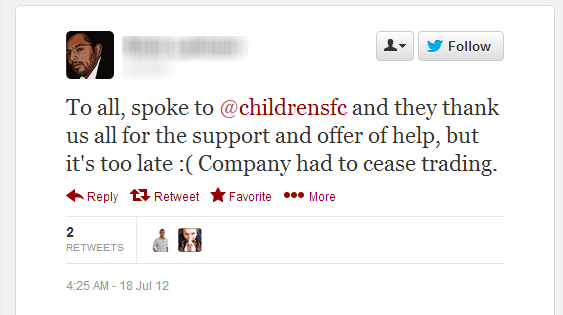Preventing Google From Killing Your Business

Too much reliance on Google’s organic traffic plus a hit by an algorithm update like Penguin, and your business can go south from one day to another. Sound too dramatic?
I don’t wish this on anyone but sadly, it happens, and I’m confident this is not the only case.
The best way to be Google-safe and to build a thriving online business is to simply ignore Google. Yes, that’s right. This might sound a bit strange, especially coming from someone who makes a living selling SEO services. However, I am also a business owner and the more I learn about business management, the more I realize that if a business finds itself in that situation, it’s because it is too dependent on search engines.
The underlying cause of this reliance on organic search results might be attributed in part to the fact that business owners tend to think of this traffic as “unpaid.” Once they start a website and get organic visits (mistakenly considered “free” visits), they realize the power of SEO and start educating themselves about it and demanding more of it. But this traffic is not free at all, and in competitive niches, it is even more expensive than PPC advertising. Soon, they end up with SEO budgets and an increased reliance on Google search results.
I challenge you to stop obsessing about organic visibility and start thinking of organic traffic from any search engine as a gift that may come or not, and which could go with any new search algorithm update.
In this article I am not going to share any SEO “secrets” with you – I apologize if that’s what you were looking for – but rather, I will discuss different traffic sources upon which you should split your online marketing efforts on. After all, no one likes to check his or her organic rankings and traffic constantly.
Of course, I am not saying that organic traffic from search engines is bad, rather, I am suggesting that an online business will be safer if its revenue is coming from a variety of sources. This is not SEO best practice; it is “business 101,” as some would say.
This is the divide and conquer concept applied to business planning. In plain words, it means not putting all your eggs in one basket. Here are several traffic sources to diversify to:
- Paid search
- Direct
- Referral
- Feed
- Social
Paid Search
The most common paid search traffic source is pay -per-click platforms like AdWords, but there are others you can try too, such as Yahoo! and Bing or second-tier search engines. Banner advertising is also something to consider for branding purposes and re-marketing.
Email Marketing
Ask the online marketing veterans and they will all say the same thing: The secret is in the list. True, and enough said. If you don’t have a plan to collect email addresses from visitors, go ahead and implement one, or several.
Direct
Direct, or type-in, traffic is actually an indication of how successful you are at building a brand. Direct traffic usually has high conversion rates and good profits. While existing customers often drive a large portion of a company’s revenue, they are not easily gained. Good products and services are requirements, leading to word-of-mouth and direct traffic. So make sure that you do a good job.
Referral traffic
These are people clicking on links found on other websites and landing on your website. Aim at getting your expertise in front of your audience. This can be accomplished by publishing research and white papers, important news and press releases, or sharing documents on third party websites. You should also experiment with engaging in relevant forum discussions, Q&A sites, and comment marketing.
Feed
This is your blog-driving traffic. Of course, this means you have a blog, and that you publish great content to which people subscribe. Publish as often as you can to educate and impress your target audience. Keep doing it for a couple of years to reap the full benefits of blogging. This continual content publishing won’t be easy. In fact, it will be one of the most difficult parts of your so-called “content marketing,” but after about 20 months (according to some research), it will start paying off.
Social
Some swear by it, others say it’s a waste of time. Don’t believe anyone until you test it for yourself. Be prepared to spend a good amount of time to connect with your target market properly. Social media success is not something you can achieve overnight (unless you’re a Bieber or Kardashian) and is quite demanding.
Some personal advice – never try to sell your services on professional social networks like LinkedIn. Instead, sell your expertise.
How do you allocate time and resources for each source?
This can be figured out based on conversion rates for each source. That means you have to drive sufficient traffic from each source first to draw statistically significant conclusions. Each industry and niche will have its own figures.
Conclusion
As a business owner, you do everything possible to achieve success and to continue to make sure that your business becomes more and more successful. The last thing that you need is to have anyone or anything get in the way of that. If you see that an entity such as Google is hurting rather than helping your business, you must figure out a way to succeed in spite of it.
[signoff][/signoff]



Raffi Jamgotchian via LinkedIn
Great article. We all glom onto what’s new and shiny. The offer and the content are more important that the medium. Saying yellow pages or direct mail doesn’t work isn’t productive. Also, user experience is just as important as getting them there. If you write just for the search engines then you may end up with something that is meaningless. This is why were so many effective SEOs overseas. They didn’t have to write for people reading it. These efforts by the search engines are a way to correct this. So writing with good content and using other means to get people there besides SeO will actually help it.
Thanks Raffi. Link building seems to slowly transforming in just “do good marketing” or RCS as others coined it. And this is good for companies here in North America, but will kill a lot of the overseas companies. Unbelievable, but I still get few emails with “500 directory submission, 250 social bookmarkings..”.
Via LinkedIn Groups
Group: Linked Business
Discussion: Where you affected by Google algorithm update?
The ONLY way websites get penalized by Google is from bad SEO strategies and thin content. To counter bad SEO, do good SEO, trace back and delete spam links and directory links. Generate great content via blog posts and share it in social. If its good enough, others will share and comment. That activity is a strong signal to search that your site is worth ranking. Keep it up and climb the rankings.
— Randy Milanovic us Author of: Findability: Why Search Engine Optimization is Dying + 21 New Rules of Content Marketing for 2013 and Beyond.
By Randy Milanovic
Thanks for commenting, Randy. I agree that vast majority of the websites get penalized because of bad SEO. However, there are websites that lost traffic due to algorithm updates and they were not spamming or doing bad SEO, or just stopped doing SEO.
Via LinkedIn Groups
Group: “Write It Down”-A Website for Writers
Discussion: Where you affected by Google algorithm update?
Google algorithm updates generally only affect a small percentage of websites and specifically target certain types of SEO practices like keyword stuffing and link farming. Most businesses that write original organic content will be fine.
Relying solely on the organic traffic from search engines will rarely be sufficient to generate enough traffic to justify the time spent creating and maintaining a website. It will need to be backed up with ads and a social network strategy as well.
There are hundreds of algorithm updates every year and very few of them have as broad an impact as Panda did a couple of years ago. Since then SEO marketers have become much more savvy about what constitutes black hat tactics.
By David Mattichak
David, the first Panda update in Feb 2011 affected 12% of the searches done on Google, and a significant number of websites (87% of marketers call the updates “significant or highly significant.” – according to econsultancy). Of course when you compare the number of sites affected with 200M+ registered domain names, it seems small.
However, I have to admit it, Matt is right on focusing on user. To me that means identifying their needs and prove with content you can address and help them.
+Ahmed Khalifa via Google+
The best advice is to not put all your eggs in one basket, which in this will be Google. You will regret in the long run if you depend solely on Google for your business.
Via LinkedIn Groups
Group: Publishing and Editing Professionals
Discussion: Where you affected by Google algorithm update?
Google changes their search algorithms an average of 500 times a year, so while I wouldn’t necessary agree with the “ignore Google” statement, I wouldn’t put all the eggs in that basket either.
By Lenah Parente
What I really mean by “ignore Google” is stop being obsessed with optimizing your site for search engine and rather give more attention to your target market.
It should be noted that while Google has targeted many article distribution sites, you will not be penalized for having your content on these sites- the more likely possibility will be these back links will have less power and thus be less effective- so there is no need to remove any of your content from these sites.